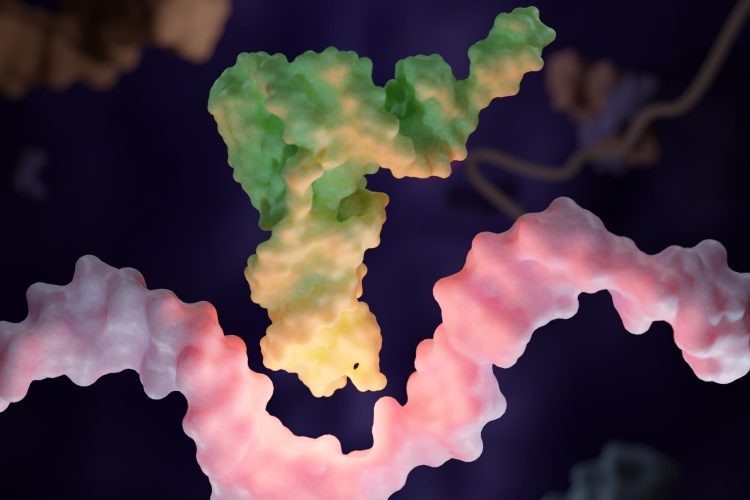New tRNA tech aims to rewrite rare disease treatment
Posted: 9 June 2025 | Drug Target Review | No comments yet
Alltrna is redefining the future of rare disease treatment with engineered tRNA therapeutics that target genetic mutations – not just individual diseases. CEO Michelle Werner shares how this bold, mutation-driven approach could unlock universal treatments for thousands of patients long overlooked by traditional medicine.


The landscape of genetic medicine is undergoing a profound transformation, driven by innovative approaches that challenge the traditional, disease-specific paradigms. One company leading the charge in this revolution is Alltrna, whose pioneering work in engineered transfer RNA (tRNA) therapeutics is offering new hope for patients with rare genetic diseases. In this interview, Michelle Werner, CEO of Alltrna, shares insights into the company’s unique mutation-driven approach, the significance of premature termination codons, and the company’s vision for the future of genetic medicine.
A personal journey to Alltrna
Michelle Werner’s career has spanned over 20 years in the pharmaceutical industry, where she developed her expertise in oncology drug development at leading companies such as Bristol Myers Squibb, AstraZeneca, and Novartis. However, her decision to join Alltrna in 2022 was not only the next step in her professional trajectory but also inspired by a powerful personal connection to the mission.
My transition to biotech and rare diseases was deeply personal – my son was diagnosed with Duchenne muscular dystrophy in 2020.
“My transition to biotech and rare diseases was deeply personal – my son was diagnosed with Duchenne muscular dystrophy in 2020,” Michelle explains. “This experience underscored the gaps in rare disease innovation, motivating me to lead Alltrna, a company pioneering engineered tRNA therapies to address a broad range of genetic diseases in a profound way unlike any other genetic modality.”
Biomarkers are redefining how precision therapies are discovered, validated and delivered.
This exclusive expert-led report reveals how leading teams are using biomarker science to drive faster insights, cleaner data and more targeted treatments – from discovery to diagnostics.
Inside the report:
- How leading organisations are reshaping strategy with biomarker-led approaches
- Better tools for real-time decision-making – turning complex data into faster insights
- Global standardisation and assay sensitivity – what it takes to scale across networks
Discover how biomarker science is addressing the biggest hurdles in drug discovery, translational research and precision medicine – access your free copy today
Alltrna’s unique approach focuses on addressing genetic diseases at a fundamental level, shifting the paradigm from a one-disease, one-therapy model to a mutation-specific strategy that could transform the treatment of hundreds of rare diseases.
The mutation-driven approach
One of the hallmarks of Alltrna’s strategy is its ability to target genetic mutations that are shared across diseases, which differs significantly from traditional genetic medicines that take a one-disease-at-a-time approach. To do this, Alltrna leverages the unique biology of tRNA and its AI-enabled platform to design engineered tRNAs that can restore full-length protein production in diseases caused by shared genetic mutations, such as premature termination codons. These codons signal the premature end of protein translation, resulting in truncated or non-functional proteins.
we are first focused on engineering tRNAs to restore protein production in diseases caused by premature termination codons.
“Alltrna focuses on a mutation-driven approach. With our AI-enabled platform, we are first focused on engineering tRNAs to restore protein production in diseases caused by premature termination codons,” Michelle says. “Instead of targeting individual diseases, our engineered tRNA can potentially treat hundreds of diseases caused by the same genetic mutation, with a single therapeutic.”
This shift in approach has the potential to greatly expand the number of patients who can benefit from genetic medicines, opening doors to more efficient and scalable treatments for rare diseases.
The significance of targeting premature termination codons
Nonsense mutations, which create premature termination codons, are responsible for a wide variety of genetic diseases. These mutations are present in approximately 10 percent of patients across all genetic disorders, meaning that people with different diagnoses may share a common genetic mutation. By targeting these mutations, Alltrna’s engineered tRNA technology offers the possibility of a universal treatment for patients with what the company refers to as “Stop Codon Disease.”
This approach has the potential to provide a universal treatment for thousands of patients suffering from what the company classifies as Stop Codon Disease.
“This approach has the potential to provide a universal treatment for thousands of patients suffering from what the company classifies as Stop Codon Disease – conditions caused by premature termination codons across various genetic disorders,” Michelle explains.
In essence, Alltrna’s approach aims to bypass the need for individual treatments for each genetic condition, providing a broad-reaching solution that addresses the root cause of a wide range of disorders.
AP003: a promising candidate for rare liver diseases
In December 2024, Alltrna announced its first development candidate, AP003, an engineered tRNA formulated in a lipid nanoparticle. This candidate is designed to restore protein production in patients with a specific premature termination codon, Arg-TGA, where a codon encoding the amino acid arginine (Arg) is mutated to the stop codon TGA.
What sets AP003 apart is the strong preclinical proof-of-concept that has been demonstrated in multiple animal models of liver stop codon disease, including phenylketonuria (PKU) and methylmalonic acidemia (MMA). “A single dose of AP003 tRNA restored significant levels of functional protein – up to 25 percent for MMA and 7 percent for PKU – well above the clinical thresholds believed to be beneficial for each disease,” Michelle notes.
In PKU models, AP003 was also shown to reduce phenylalanine (Phe) levels by 76 percent, addressing the toxic accumulation of Phe in the blood – a hallmark of the disease. These results support the continued development of AP003 and its potential to advance into Investigational New Drug (IND)-enabling studies.
Accelerating drug development with basket trials
One of the strategies that Alltrna is employing to accelerate the development of its tRNA therapeutics is the use of basket trials. While commonly used in oncology, the basket trial approach is novel for rare genetic diseases.
Instead of conducting separate trials for each disease, a basket trial groups patients based on the shared presence of a specific mutation (eg, a premature termination codon), regardless of their specific disease.
“Instead of conducting separate trials for each disease, a basket trial groups patients based on the shared presence of a specific mutation (eg, a premature termination codon), regardless of their specific disease,” Michelle explains. “This approach could help address the severe unmet need particularly in ultra-rare diseases, where a lack of clinical trials often means no regulatory approved treatments supporting the justification for regulatory pathways such as accelerated approval.”
The ability to use a single therapeutic for multiple diseases with a common genetic mutation enables therapeutic development for ultra-rare conditions that may be too small to support individual clinical programs. While identifying patients with specific mutations would be needed as a component of the diagnostic process, this approach opens new opportunities for patient populations that would otherwise remain unaddressed.
Engineered tRNA
While traditional genetic therapies like gene editing or mRNA therapy are focused on modifying a specific gene or delivering functional mRNA for a single disease, Alltrna’s engineered tRNA technology offers a broader, more universal solution.
“Unlike gene editing, which makes irreversible DNA changes, engineered tRNA allows for controlled, reversible interventions,” Michelle highlights. “A single tRNA therapeutic could treat multiple diseases caused by the same mutation.”
This approach offers several key advantages over traditional genetic medicines:
- Disease-agnostic: A single engineered tRNA can treat multiple diseases caused by the same mutation.
- Non-permanent modifications: Unlike gene editing, engineered tRNA provides a reversible intervention, and is unlikely to carry the off-target risks associated with irreversible DNA changes.
- Large-protein and ‘Goldilocks’ diseases: Because of the small size and unique mechanism of action of engineered tRNA, it is uniquely suited to address diseases involving large proteins or conditions requiring precise protein levels.
- Broad applicability: Alltrna’s platform could extend beyond rare liver diseases to address other conditions, such as muscle and central nervous system (CNS) disorders.
Alltrna’s vision for the future
Looking to the future, Alltrna has set ambitious goals for the continued development of its platform. One of the key milestones is progressing its first candidate, AP003, through IND-enabling studies and into first-in-human clinical trials. This will mark a critical step in validating the potential of engineered tRNA therapeutics.
Beyond AP003, Alltrna is working to expand its pipeline to address additional nonsense mutations and develop treatments for other rare diseases, including those affecting muscle and CNS tissues. By applying its mutation-driven approach to a broad range of genetic conditions, Alltrna hopes to transform the paradigm of genetic medicine.
“Our long-term goal is to extend beyond liver diseases to muscle and CNS disorders. The ability to apply a single engineered tRNA therapeutic across hundreds of rare diseases could fundamentally shift how we think about genetic medicine – moving away from the traditional one-disease, one-drug model toward a mutation-driven, scalable approach,” Michelle envisions.
As Alltrna continues to push the boundaries of genetic medicine, it is clear that the company’s innovative approach has the potential to bring transformative treatments to patients who have long been underserved by existing therapies.


Michelle is a seasoned pharmaceutical executive with more than 20 years in the industry spanning commercial and research & development (R&D) responsibilities. Prior to Alltrna, Michelle served as Worldwide Franchise Head, Solid Tumours at Novartis Oncology, where she was responsible for delivering the disease area strategies across multiple tumours and led business development efforts resulting in a doubling of long-term portfolio value for the franchise. Previous to Novartis, Michelle was a senior leader at AstraZeneca and as Global Franchise Head in Haematology, she was critical in launching multiple indications worldwide for CALQUENCE®. Prior to this, Michelle was Head of US Oncology, where she led the business through dramatic growth in both team and revenue through eight-plus product launches. Previous to AstraZeneca, Michelle was with Bristol-Myers Squibb for 10 years in various positions of increasing responsibility including roles in sales, marketing, and market access in the US and UK, and above market in Europe (based in France) and global almost exclusively in oncology. Michelle started her professional career in R&D, working hands-on with patients at the Oncology Clinical Trials Unit at Harvard Medical School before moving into industry in clinical operations. Outside of her corporate responsibilities, Michelle is a wife and mother to three children and is a member of the rare disease community. She is currently serving a Board appointment for the non-profit organisation Rare Disease Renegades, a purpose that fuels her passions both personally and professionally.
Related topics
Artificial Intelligence, Biotherapeutics, Gene Therapy, Genetic Analysis, Molecular Biology, Orphan drugs, Precision Medicine, Therapeutics
Related conditions
Methylmalonic Acidemia (MMA), Phenylketonuria (PKU)
Related organisations
Alltrna
Related people
Michelle Werner (CEO of Alltrna)








